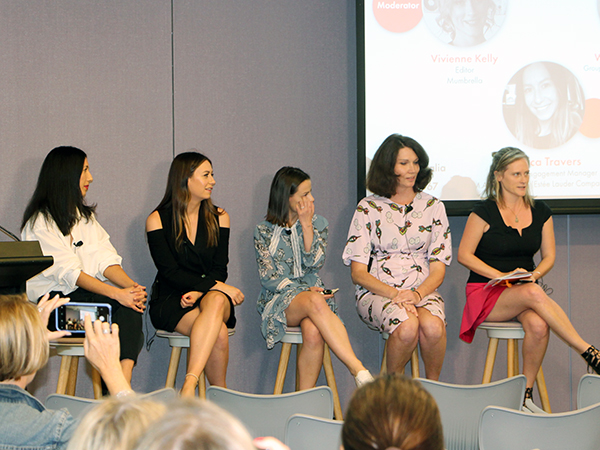
Millennials stand accused of “killing” so many industries, but in actual fact it’s the brands themselves that are in danger of slaughtering their own businesses due to a lack of agility, according to panelists at the Interactive Advertising Bureau’s (IAB) MeasureUp event.
Speaking on a ‘Brands through the eyes of youth: Insights to give the edge on Millennials & GenZ’ panel, moderator Vivienne Kelly, editor at Mumbrella, kicked off with discussing the economic and cultural power of the younger generations. Kelly queried why these generations have been accused of “killing” so many industries and if this can be terrifying for marketers who are desperate to understand these demographics and fit their brands into their lifestyles.
Whitney Higginson, group strategy and response manager at Pedestrian Group, said it was a “really lazy assumption” to think that millennials or the youth are killing industries.
“Millennials are only a really small percentage of the total addressable market so to blame the fact that industries have been declining is just not true across the board,” Higginson said.
Panelist Lisa McIntyre, senior insights director customer, commercial and youth at data-driven marketing company Engine, agreed, saying “they’re definitely not killing brands and industries”.
“Brands and industries are killing themselves by not being agile and that also comes from not listening [to consumers] either.”
McIntyre referenced American-founded global retail brand Forever 21 which last month revealed it would be closing hundreds of stores amid bankruptcy proceedings, as an example that brands can learn from.Media reports said its substantial real-estate cost and lagging innovation and sustainability efforts were to blame for the cuts.
“That was a billion dollar fast-fashion company and they just weren’t competitive enough,” McIntyre said.
“It’s that rise of the environmental consciousness that is becoming more important, and Forever 21 got on board too late. They tried to paint a picture of sustainability in a fast fashion world and basically they just missed the boat.”
As well as the rise of rental brands such as designer dress and accessory hire business Rent the Runway, McIntyre said sustainable fashion brands and market moves such as 7-Eleven’s pioneering cup recycling initiative, hugely appeal to the more environmentally conscious younger generations.
Jessica Travers, consumer engagement manager at MAC Cosmetics at The Estée Lauder Companies Australia, said the younger generations are “definitely holding us accountable” which is a good thing as it encourages growth, makes brands challenge themselves and ensures they have their ears to the ground.
“You really need to tap into everyone in your business but also be conducting social listening and be agile enough to act on certain things,” Travers said.
“I know it can be very challenging when you’re working a big organisation and sometimes you do feel like you’re trying to turn the Titanic, but you just need to be as reactive as you can in whatever ways you can.”
McIntyre said the current market provides a huge opportunity for brands to target the disenfranchised younger generations who don’t believe politicians are really serving their needs right now and instead, do believe that brands can do part of that job.
“It is a real opportunity to pick something, align to it and say, ‘this is how we’re going to actually help you create some change here’, because millennials and gen Zs still do believe that they actually can make a difference – which is really beautiful,” she said.
“They are frustrated but they haven’t given up and they’re just looking to different avenues to make these things happen. This a great entry point for brands and publishers to come in and fill some of that void.”
Crystal Andrews, commercial editor at the Daily Mail Australia noted however that brands that think it’s ok to simply attach their campaign to a social cause, without being genuine in their pursuits, will quickly learn that gen Z won’t stand for it.
“It’s about being genuine and having something to back up your position.And understanding that you don’t have to stand for every social cause.”
Andrews emphasised this position noting that when brands are developing marketing communications or content for this generation, the big buzzwords are authenticity and transparency – as well as having that willingness to be on the platforms that the younger demographics are on.
Andrews cited a MAC lipstick campaign on Daily Mail Australia’s Snapchat, using influencers, in which 65% of its Australian audience is Gen Z, which was perfect for the audience the cosmetics giant was trying to reach.
The panel delved into further marketing insights into the real attitudes and motivations of the ‘grown up digital’ generations with Kelly asking panelists, what, beyond “avocado munching lunatics”, were the most off-base characterization of millennials or Gen Z used by brands or publishers were.
Higginson said that age was a huge characterisation, with brands broadly shooting for 18 -34 year olds.
“If that’s what you’re basing your communications strategy off then you’re really doing a disservice to it because you cannot base any nuances or tension points within that audience and target effectively, or create insights off the back of that. It’s too broad,” Higginson said.